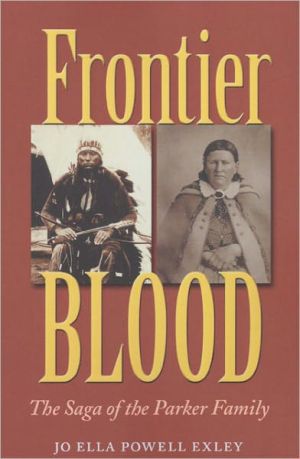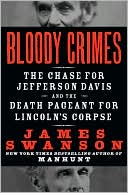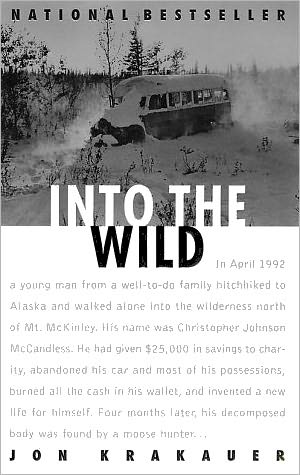Frontier Blood: The Saga of the Parker Family
2001 Summerfield G. Roberts Award, presented by the Sons of the Republic of Texas \ Drawing on a wealth of contemporary accounts, including several first-person stories, Jo Ella Powell Exley follows Cynthia Ann-Parker-a descendant of Elder John Parker-last of the great Comanche war chiefs- through her life in the Indian camp and eventually her recapture by her birth family. She also tells the dramatic story of Quanah Parker through childhood, battle, surrender, and reservation life.\ This...
Search in google:
The descendants of Elder John Parker were a strange and often brilliant family who may have changed the course of Texas and western history. Their obsession with religion and their desire for land took them from Virginia to Georgia, Tennessee, Illinois, and finally Texas. From their midst came Cynthia Ann, taken captive by Comanches as a young girl and recaptured as an adult to live in grief among her birth family until she died. From their line too came her son, Quanah Parker, last of the great Comanche war chiefs -- and first of their great peace leaders. Though the broad outlines of the stories of Cynthia Ann and Quanah are familiar, Jo Ella Powell Exley adds a new dimension by placing them in the context of the stubborn, strong, contentious Parker clan, who lived near and dealt with restive Indians across successive frontiers until history finally brought them to Texas, where their fate changed. Drawing on a wealth of contemporary accounts, including several first-person stories, she follows Cynthia Ann through her life in the Indian camp and eventually her recapture by her birth family. Exley also tells the dramatic story of Quanah Parker, often in his own words as recorded by his friends, through childhood, battle, surrender, and reservation life. This gripping narrative is filled with authentic flavor and sets straight a story that has sometimes been distorted. It offers new insight if not a definitive interpretation of Cynthia Ann Parker's last years, providing a more complex picture of the "white" years of a woman who had matured among the Comanches since the age of nine. Among the documents from which Exley draws are a short autobiography of Daniel Parker, Rachel Parker Plummer's two narratives of her Indian captivity, James Parker's account of his search for Rachel and the other captives, and several autobiographical accounts Quanah dictated to his friends. In this fascinating narrative history, Exley tells a compelling story and gives rich character insights into the extended Parker family. But she also does more: she gives a feeling of what it was like to live on the frontier in the eighteenth and nineteenth centuries. Publishers Weekly Captivity diaries, those often brutal accounts of settlers taken prisoner by American Indians, might be considered a genre in their own right. Drawing heavily on such first-person testimonies, Exley (editor of Texas Tears, Texas Sunshine: Voices of Frontier Women) traces the Parker family's trajectory, from Elder John (born in 1758) to his great-grandson Quanah Parker, a Comanche war chief. This family had a particular impact on the development of Texas and the West and was especially determined to make a life there, despite the likelihood of violence. Rachel Parker, captured in 1836 by raiding Comanches and brutally tortured along with her young son, is eventually rescued. Nine-year-old Cynthia Ann, also kidnapped, makes a life among the Comanches and bears Quanah and two other children. After 24 years, Cynthia Ann is returned to her white family but never adjusts. The rest of the book tells the story of Quanah, who ultimately negotiates peace with the white settlers. His speech (in English) at his mother's graveside underlines the changed attitude of the former war chief: "Forty years ago my mother died. She captured by Comanches.... Love Indian and wild life so well no want to go back to white folks.... I love my mother. I like white people. Got great heart. I want my people follow after white way, get educate, know work, make living when payments stop." Vivid, unsparing accounts, much insight into the pioneer experience and the details of early interracial relations will make this book popular among devotees of the history of the American West. 12 b&w photos. (Nov. 26) Copyright 2001 Cahners Business Information.
List of IllustrationsIXPrefaceXIPart I.Daniel1.A Poor Sinner32.The Wrong Road113.Plain and Unpolished--The Diamond in the Rough State24Part II.Rachel4.Father, Forgive Them415.Vengeance Is Mine616.How Checkered Are the Ways of Providence82Part III.James W.7.The Tongue of Slander978.The House of God1069.Sundry Charges11310.Called Home122Part IV.Cynthia Ann11.Miss Parker13312.The Hand of Savage Invasion14413.The Long-Lost Relative16514.Thirsting for Glory18315.It Was Quanah20216.So Many Soldiers21917.Blood upon the Land23118.I Lived Free252Notes265Bibliography303Index323
\ Publisher's Weekly"Vivid, unsparing accounts, much insight into the pioneer experience and the details of early interracial relations will make this book popular among devotees of the history of the American West." --Publisher's Weekly\ \ \ \ \ \ True West" . . . . only now do we have the whole fascinating story of the Parker clan, from their westward migration to Texas and Cynthia's Comanche captivity, to Quanah's role as the last great war chief." —True West\ \ \ Journal of the West"This narrative provides a stunning portrayal of frontier life in Texas, the dangers of Indian-white conflict, the Comanche tradition of kidnapping young children, and the shortsighted Indian policies of the Texas Republic and the United States government. This book will interest religious historians because of the Baptist influence among the Parkers, frontier scholars because of the chronological period and geographic setting, and those who favor smooth biographies of pioneering Texans." —Journal of the West\ \ \ \ \ Texas Parks & Wildlife"Entertaining as well as informative, Frontier Blood brings a fresh perspective to a familiar Texas story." —Texas Parks & Wildlife\ \ \ \ \ Journal of the West"This narrative provides a stunning portrayal of frontier life in Texas, the dangers of Indian-white conflict, the Comanche tradition of kidnapping young children, and the shortsighted Indian policies of the Texas Republic and the United States government. This book will interest religious historians because of the Baptist influence among the Parkers, frontier scholars because of the chronological period and geographic setting, and those who favor smooth biographies of pioneering Texans." --Journal of the West\ \ \ \ \ \ Texas Parks & Wildlife"Entertaining as well as informative, Frontier Blood brings a fresh perspective to a familiar Texas story." --Texas Parks & Wildlife\ \ \ \ \ \ Journal of the West"This narrative provides a stunning portrayal of frontier life in Texas, the dangers of Indian-white conflict, the Comanche tradition of kidnapping young children, and the shortsighted Indian policies of the Texas Republic and the United States government. This book will interest religious historians because of the Baptist influence among the Parkers, frontier scholars because of the chronological period and geographic setting, and those who favor smooth biographies of pioneering Texans." --Journal of the West\ \ \ \ \ \ True West" . . . . only now do we have the whole fascinating story of the Parker clan, from their westward migration to Texas and Cynthia''s Comanche captivity, to Quanah''s role as the last great war chief." --True West\ \ \ \ \ \ Texas Parks & Wildlife"Entertaining as well as informative, Frontier Blood brings a fresh perspective to a familiar Texas story." --Texas Parks & Wildlife\ \ \ \ \ \ Publishers WeeklyCaptivity diaries, those often brutal accounts of settlers taken prisoner by American Indians, might be considered a genre in their own right. Drawing heavily on such first-person testimonies, Exley (editor of Texas Tears, Texas Sunshine: Voices of Frontier Women) traces the Parker family's trajectory, from Elder John (born in 1758) to his great-grandson Quanah Parker, a Comanche war chief. This family had a particular impact on the development of Texas and the West and was especially determined to make a life there, despite the likelihood of violence. Rachel Parker, captured in 1836 by raiding Comanches and brutally tortured along with her young son, is eventually rescued. Nine-year-old Cynthia Ann, also kidnapped, makes a life among the Comanches and bears Quanah and two other children. After 24 years, Cynthia Ann is returned to her white family but never adjusts. The rest of the book tells the story of Quanah, who ultimately negotiates peace with the white settlers. His speech (in English) at his mother's graveside underlines the changed attitude of the former war chief: "Forty years ago my mother died. She captured by Comanches.... Love Indian and wild life so well no want to go back to white folks.... I love my mother. I like white people. Got great heart. I want my people follow after white way, get educate, know work, make living when payments stop." Vivid, unsparing accounts, much insight into the pioneer experience and the details of early interracial relations will make this book popular among devotees of the history of the American West. 12 b&w photos. (Nov. 26) Copyright 2001 Cahners Business Information.\ \








